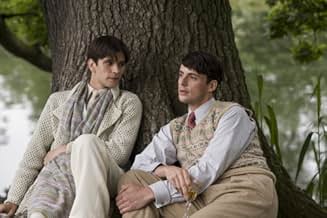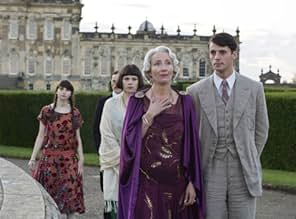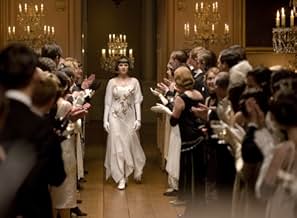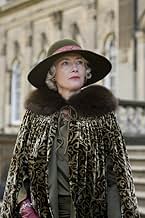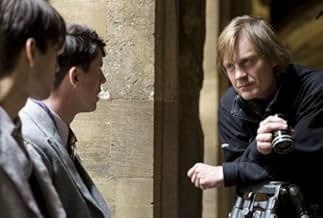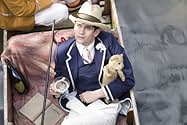IMDb-BEWERTUNG
6,6/10
13.961
IHRE BEWERTUNG
Eine ergreifende Geschichte über verbotene Liebe und den Verlust der Unschuld, die in England vor dem Zweiten Weltkrieg spielt.Eine ergreifende Geschichte über verbotene Liebe und den Verlust der Unschuld, die in England vor dem Zweiten Weltkrieg spielt.Eine ergreifende Geschichte über verbotene Liebe und den Verlust der Unschuld, die in England vor dem Zweiten Weltkrieg spielt.
- Regie
- Drehbuch
- Hauptbesetzung
- Auszeichnungen
- 11 Nominierungen insgesamt
Empfohlene Bewertungen
Among many of the most prestigious literature selections, not to mention mini-series, Brideshead Revisited not only wasn't on my radar, I didn't even know if it would be the kind of well-regarded literature or mini-series I intended to watch. But as this newly revised picture, now a mere 136 minutes vs 10 hours, it looked interesting if only as a kind of "handsomely made" picture (you know the kind, along the lines of Atonement for recent comparison). I was also intrigued by the allure of a huge, sprawling mansion here called Brideshead, as it reminded me of Alain Resnais's film Last Year at Marienbad and how memories and recollections and lost love and hope is explored in the spaces of this dark, cold region of exquisite luxury. Some of that is explored in this film, and some of it... isn't.
It's for the most part a fairly tragic story of a young man, Charles (Matthew Goode, charming and suave but also subtle and down-beat, a really fine turn), who enrolls at Oxford and meets a meek/'fey' guy named Sebastian, and through him he's introduced (reluctantly in point of fact) to Sebastian's family, including his sister Julia, and his very cold and strident mother (Emma Thompson). Sebastian really wants Charles all for himself - it's a friendship that goes just a nose-hair's length into admitting homosexuality but never really goes that far despite all appearances to the contrary - but he becomes apart of the fold, and as well falling deeply in love with Julia against 'other' wishes (mostly the matriarch's over Charles's religion).
There's a lot of the fragility of the bourgeois on display here, the arrogance and detachment that's shown very closely by the director for maximum effect. Unlike a Resnais he's not about to get too experimental with the camera; he's a careful craftsman more often than not, allowing for just enough wonderment of the whole Brideshead atmosphere to really sink into how it could be a double-edged sword of perception. And as is bound to happen with material this sprawling (at one point time jumps back 10 years, then ahead 4 years, until we kind of know where we are), a lot seems to be cut out. While it altogether makes a coherent and entertaining enough picture, I wonder how much more of a benefit this would make as an epic, where we are absorbed more fully with the Oxford school or Charles and Sebastian or even the parents (who, thankfully, are played wonderfully here by cold-as-ice Thompson and fascinatingly guilt-ridden and subtle Michael Gambon), or how the wealth structure even works here.
Indeed, I found myself not so much involved with the Charles/Sebastian stuff, even as it's fairly well-acted and well-shot enough, as I was with the themes of religion raised in the picture. This caught me off guard and hinted at something deeper being expounded upon. Yet, again, we get just tastes of what's offered more than likely in the original text, tastes that are powerful like a 'last-rites' argument, and the tortured state of being raised from the cradle with an intense, overbearing Catholic conscience.
It's for the most part a fairly tragic story of a young man, Charles (Matthew Goode, charming and suave but also subtle and down-beat, a really fine turn), who enrolls at Oxford and meets a meek/'fey' guy named Sebastian, and through him he's introduced (reluctantly in point of fact) to Sebastian's family, including his sister Julia, and his very cold and strident mother (Emma Thompson). Sebastian really wants Charles all for himself - it's a friendship that goes just a nose-hair's length into admitting homosexuality but never really goes that far despite all appearances to the contrary - but he becomes apart of the fold, and as well falling deeply in love with Julia against 'other' wishes (mostly the matriarch's over Charles's religion).
There's a lot of the fragility of the bourgeois on display here, the arrogance and detachment that's shown very closely by the director for maximum effect. Unlike a Resnais he's not about to get too experimental with the camera; he's a careful craftsman more often than not, allowing for just enough wonderment of the whole Brideshead atmosphere to really sink into how it could be a double-edged sword of perception. And as is bound to happen with material this sprawling (at one point time jumps back 10 years, then ahead 4 years, until we kind of know where we are), a lot seems to be cut out. While it altogether makes a coherent and entertaining enough picture, I wonder how much more of a benefit this would make as an epic, where we are absorbed more fully with the Oxford school or Charles and Sebastian or even the parents (who, thankfully, are played wonderfully here by cold-as-ice Thompson and fascinatingly guilt-ridden and subtle Michael Gambon), or how the wealth structure even works here.
Indeed, I found myself not so much involved with the Charles/Sebastian stuff, even as it's fairly well-acted and well-shot enough, as I was with the themes of religion raised in the picture. This caught me off guard and hinted at something deeper being expounded upon. Yet, again, we get just tastes of what's offered more than likely in the original text, tastes that are powerful like a 'last-rites' argument, and the tortured state of being raised from the cradle with an intense, overbearing Catholic conscience.
No love story can be altogether gratifying in which the central choices are decided by the mother of the woman in love, even less, when she is the mother of both lovers, and has faith that she is protecting their everlasting spirits. That is what seems to be the predicament in Evelyn Waugh's novel, now adapted into a stagnant film in which one is not invited to feel or react due to its own lack of feeling or solidly portrayed consequence.
This film version focuses on forbidden love and the death of purity, set before WWII. Matthew Goode, who was excellent as the villain in The Lookout, becomes spellbound with a noble family, first because of his friendship with a charming, provocative, apparently homosexual contemporary, and then his sister. The fluctuation of Goode's obsessions suggest the decay of a self-indulgent upper crust in England flanked by the two World Wars, related in the course of his recurring stays at the Brideshead estate. What's more fundamental to Waugh's story is the harsh Catholicism of the family, as imposed by their matriarch, played by Emma Thompson, the high point of the film by far. Their religious beliefs are confronted by the son's homosexuality, the daughter's adulterous liaison with Goode, and Goode's atheism.
There are two curious fathers in the film. Michael Gambon is one, still legitimately married sure enough, but is ostracized, living in a Venetian palazzo with his mistress, Greta Scacchi in an unexpected comeback. Goode's father is a definite oddball who lives enclosed in a London house and seemingly favors playing chess with himself to talking to his son.
The main character is a penniless, virtually parentless youth drifting through an alien social system. Goode plays him featurelessly really, a nondescript motor for the other characters. Ben Whishaw steals all of his scenes as the gay son. The daughter could definitely have been portrayed more warily. The actress, Hayley Atwell makes the most of her I suppose, but why would she marry the revolting and unbearable suitor instead of Goode?
I am sure that the reason this film is not very effective at all is because so much background and source material is condensed and maybe sacrificed into such a shorter running time. But why are so many other adaptations effective in spite of this factor?
This film version focuses on forbidden love and the death of purity, set before WWII. Matthew Goode, who was excellent as the villain in The Lookout, becomes spellbound with a noble family, first because of his friendship with a charming, provocative, apparently homosexual contemporary, and then his sister. The fluctuation of Goode's obsessions suggest the decay of a self-indulgent upper crust in England flanked by the two World Wars, related in the course of his recurring stays at the Brideshead estate. What's more fundamental to Waugh's story is the harsh Catholicism of the family, as imposed by their matriarch, played by Emma Thompson, the high point of the film by far. Their religious beliefs are confronted by the son's homosexuality, the daughter's adulterous liaison with Goode, and Goode's atheism.
There are two curious fathers in the film. Michael Gambon is one, still legitimately married sure enough, but is ostracized, living in a Venetian palazzo with his mistress, Greta Scacchi in an unexpected comeback. Goode's father is a definite oddball who lives enclosed in a London house and seemingly favors playing chess with himself to talking to his son.
The main character is a penniless, virtually parentless youth drifting through an alien social system. Goode plays him featurelessly really, a nondescript motor for the other characters. Ben Whishaw steals all of his scenes as the gay son. The daughter could definitely have been portrayed more warily. The actress, Hayley Atwell makes the most of her I suppose, but why would she marry the revolting and unbearable suitor instead of Goode?
I am sure that the reason this film is not very effective at all is because so much background and source material is condensed and maybe sacrificed into such a shorter running time. But why are so many other adaptations effective in spite of this factor?
Is this film a worthy interpretation of "Brideshead Revisited"? Well, up to a point, Lord Copper, as another one of Evelyn Waugh's characters was wont to say.
First, scriptwriter Andrew Davies, a past master of adaptation of great and not-so great literary works, has put the focus on the Charles and Julia love story rather than the Charles and Sebastian 'romantic friendship' as Cara, Lord Marchmain's Italian mistress puts it. The religious aspect is dealt with almost incidentally.
Second, Lady Marchmain, as played by Emma Thompson, is a very grim person with total emotional control over her children and whose particular Christian beliefs means that she is indifferent to their suffering as to her this life is a mere precursor to the glorious afterlife the same attitude as a 9/11 hi-jacker in fact. She has none of the sweetness that Claire Bloom brought to the 1981 TV series.
Third, some of the performances owe a good deal to those in the TV series, especially Matthew Goode as Charles who has an uncanny likeness to Jeremy Irons. And of course Castle Howard reprises its role as Brideshead. Some characters were reduced to ciphers; for example Bridey who played by Simon Jones stole several scenes in 1981 but the part is reduced to a non-entity here. Michael Gambon, a consummate actor, gives us a new take on Lord Marchmain to compare with Lawrence Olivier's earlier version.
Overall, though, I was left with the impression this film has not much to say which is new. Like the recent feature film version of "Pride and Prejudice", it gives a broad outline of the story but misses out much of the rich context provided by the minor characters. Oh, read the book instead.
First, scriptwriter Andrew Davies, a past master of adaptation of great and not-so great literary works, has put the focus on the Charles and Julia love story rather than the Charles and Sebastian 'romantic friendship' as Cara, Lord Marchmain's Italian mistress puts it. The religious aspect is dealt with almost incidentally.
Second, Lady Marchmain, as played by Emma Thompson, is a very grim person with total emotional control over her children and whose particular Christian beliefs means that she is indifferent to their suffering as to her this life is a mere precursor to the glorious afterlife the same attitude as a 9/11 hi-jacker in fact. She has none of the sweetness that Claire Bloom brought to the 1981 TV series.
Third, some of the performances owe a good deal to those in the TV series, especially Matthew Goode as Charles who has an uncanny likeness to Jeremy Irons. And of course Castle Howard reprises its role as Brideshead. Some characters were reduced to ciphers; for example Bridey who played by Simon Jones stole several scenes in 1981 but the part is reduced to a non-entity here. Michael Gambon, a consummate actor, gives us a new take on Lord Marchmain to compare with Lawrence Olivier's earlier version.
Overall, though, I was left with the impression this film has not much to say which is new. Like the recent feature film version of "Pride and Prejudice", it gives a broad outline of the story but misses out much of the rich context provided by the minor characters. Oh, read the book instead.
The greatness of the original Brideshead Revisited was in the luxury of being able to transpose a very complicated emotional and intellectual book into words. It succeeded in this, but only just, due to superb direction, photography and script which, even in its sparseness, only just allowed the successful transition to film. The problem with anything shorter is that, if it took Mortimer so many episodes to get it right, then there are very few writers who could even get near in under 4 hours, if that. So lets stop beating about the bush. This is a sound reproduction of the calender plot but after that it is not Brideshead Revisited. Call it by another name and I will laud it. It brings in a strong homosexual element and a early sexual attraction between Charles Ryder and Miss Flyte. With that everything becomes unbalanced. Motivations change. The beauty of the original is that it hinted at ????something (a je ne sais quoi) and it was that and the ever strengthening Catholic awareness of family that made this film so fascinating. The original's masterpiece was the script supported by the cine photography. That has been lost. But taken as is, a pretty and interesting film which seems to be loosely based on an early fifties work by Waugh.
I have never read the book or seen the miniseries, so my experience wasn't clouded by already existing expectations and assumptions of the characters. Instead I was awaiting a first, and therefore unbiased look into the world of Brideshead.
As a film, it is okay bordering on good and solid. The performances are strong enough to keep the audience interested, but they do not keep us enthralled. The leads are savvy and sexy in their own rights, but they lack true appeal as performers. They can come off as rather dull in certain scenes, but in others they pull out a subtle presence that is called for in intimate, or more emotion scenes. This inconsistence was bothersome and hindered the overall telling of the story. The one presence that is felt, but is far too short is that of Emma Thompson. As the matriarchal head of the family, she is brutal and works well with the one dimensional writing she was given. If they had focused more on her, we would have been able to understand the tortured minds of Julia and Sebastian better. Instead they have Julia and Sebastian describe her to the audience, which keeps us from getting close enough to realize what deformed her mind to begin with.
Charles is, at times to weak and unsure to be accepted as someone we want to see happy. We end up being unsure of his character's intention, and not in a mysterious, purposeful way, but in a, "the film-making is too unclear" way. Is Charles just a social climber whose dreams are dashed by his wants and Atheist ways? Or is he a moral soul lost in the pull of Brideshead's condemning Catholic trappings? This is the major flaw to the film, Charles is never exposed.
Small framing problems and out-of-style shots hampered the visual appeal, but with that aside, the visuals are very lush and the score complements some well placed montages to give the viewer a true sense of the desired never-ending summer Charles and Sebastian so desperately dream after.
If you like British tales of class and religion, or period films, this one is not a letdown. It is nothing new, but nothing terrible either. I recommend it if this is your sort of thing, I was not disappointed, but I wasn't blown away.
As a film, it is okay bordering on good and solid. The performances are strong enough to keep the audience interested, but they do not keep us enthralled. The leads are savvy and sexy in their own rights, but they lack true appeal as performers. They can come off as rather dull in certain scenes, but in others they pull out a subtle presence that is called for in intimate, or more emotion scenes. This inconsistence was bothersome and hindered the overall telling of the story. The one presence that is felt, but is far too short is that of Emma Thompson. As the matriarchal head of the family, she is brutal and works well with the one dimensional writing she was given. If they had focused more on her, we would have been able to understand the tortured minds of Julia and Sebastian better. Instead they have Julia and Sebastian describe her to the audience, which keeps us from getting close enough to realize what deformed her mind to begin with.
Charles is, at times to weak and unsure to be accepted as someone we want to see happy. We end up being unsure of his character's intention, and not in a mysterious, purposeful way, but in a, "the film-making is too unclear" way. Is Charles just a social climber whose dreams are dashed by his wants and Atheist ways? Or is he a moral soul lost in the pull of Brideshead's condemning Catholic trappings? This is the major flaw to the film, Charles is never exposed.
Small framing problems and out-of-style shots hampered the visual appeal, but with that aside, the visuals are very lush and the score complements some well placed montages to give the viewer a true sense of the desired never-ending summer Charles and Sebastian so desperately dream after.
If you like British tales of class and religion, or period films, this one is not a letdown. It is nothing new, but nothing terrible either. I recommend it if this is your sort of thing, I was not disappointed, but I wasn't blown away.
WUSSTEST DU SCHON:
- WissenswertesDame Emma Thompson threatened to quit this movie if the producers persisted in pushing actress Hayley Atwell to lose weight. Atwell said that Harvey Weinstein even insulted her over lunch by saying: "You look like a fat pig on-screen. Stop eating so much."
- PatzerAfter the dinner, at which Charles first meets Lady Marchmain, the family go to pray in the private chapel. The ladies, as Roman Catholics, would have covered their heads with a scarf or a veil.
- Zitate
Sebastian Flyte: I asked too much of you. I knew it all along, really. Only God can give you that sort of love.
Top-Auswahl
Melde dich zum Bewerten an und greife auf die Watchlist für personalisierte Empfehlungen zu.
Details
- Erscheinungsdatum
- Herkunftsländer
- Offizieller Standort
- Sprachen
- Auch bekannt als
- Brideshead Revisited
- Drehorte
- Produktionsfirmen
- Weitere beteiligte Unternehmen bei IMDbPro anzeigen
Box Office
- Budget
- 20.000.000 $ (geschätzt)
- Bruttoertrag in den USA und Kanada
- 6.432.256 $
- Eröffnungswochenende in den USA und in Kanada
- 339.616 $
- 27. Juli 2008
- Weltweiter Bruttoertrag
- 13.451.186 $
- Laufzeit2 Stunden 14 Minuten
- Farbe
- Sound-Mix
- Seitenverhältnis
- 2.35 : 1
Zu dieser Seite beitragen
Bearbeitung vorschlagen oder fehlenden Inhalt hinzufügen

Oberste Lücke
By what name was Wiedersehen mit Brideshead (2008) officially released in India in English?
Antwort

